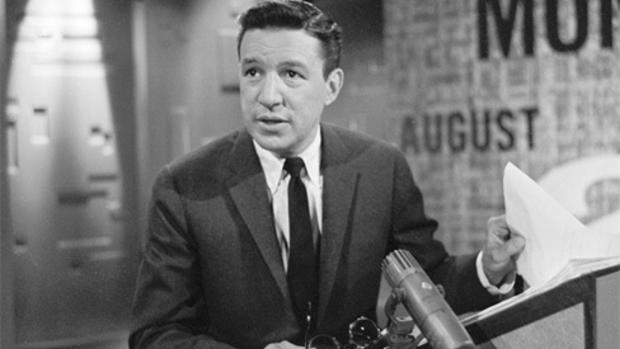Remembering Mike Wallace 1918-2012
(CBS News) For half a century, he took on corrupt politicians, scam artists and bureaucratic bumblers. His visits were preceded by the four dreaded words: Mike Wallace is here.
Wallace took to heart the old reporter's pledge to comfort the afflicted and afflict the comfortable. He characterized himself as "nosy and insistent."
So insistent, there were very few 20th century icons who didn't submit to a Mike Wallace interview. He lectured Vladimir Putin, the President of Russia, on corruption. He lectured Yassir Arafat on violence.
He asked the Ayatollah Khoumeini if he were crazy.
The Other Mike Wallace: Philanthropist and Male Nurse
CBS' iconic newsman Mike Wallace dead at 93
Quoteboard: News world reacts to Mike Wallace's passing
He traveled with Martin Luther King (whom Wallace called his hero). He grappled with Louis Farrakhan.
And he interviewed Malcolm X shortly before his assassination.
He was no stranger to the White House, interviewing his friends the Reagans . . . John F. Kennedy . . . Lyndon Johnson . . . Jimmy Carter. Even Eleanor Roosevelt.
Plus all those remarkable characters: Leonard Bernstein, Johnny Carson, Luciano Pavarotti, Janis Joplin, Tina Turner, Salvador Dali, Barbra Streisand. His take-no-prisoners style became so famous he even spoofed it with comedian Jack Benny.
It's hard to believe, but when Wallace was born in 1918 there wasn't even a radio in most American homes, much less a TV.
As a youth, Wallace said, he was "an overachiever. I worked pretty hard. Played a hell of a fiddle."
At the University of Michigan, where his parents hoped he'd become a doctor or lawyer, he got hooked instead on radio. And by 1941, Mike was the announcer on "The Green Hornet."
"My family didn't know what to make of it - an announcer?" he recalled.
He was soon the hardest-working announcer in broadcasting.
When television arrived in the 1950s, Wallace was everywhere . . . variety shows, game shows, dramas, commercials.
But it was an interview show called "Nightbeat," first broadcast in 1956, that Wallace remembered fit him like custom-made brass knuckles. "We decided to ask the irreverent question, the abrasive question, the who-gives-a-damn question."
Some, like labor leader Mike Quill, had never been spoken to that way. "Go ahead and ask your stupid questions," he retorted.
Neither had mobster Mickey Cohen, whom Wallace asked, "How many men have you killed, Mickey?"
So when "60 Minutes" was born in 1968, Wallace brought with him his "Nightbeat" persona, and contributed 40 years' worth of nosiness, impertinence, and, of course, drama.
Mike loved to mix it up. With producers, editors, even his fellow correspondents.
"I mean, we were colleagues and competitors at the same time," Wallace recalled with Morley Safer. "And so, when I wanted to do a story, and you wanted to do a story, and it's the same story . . . "
"And I come into the office the next day," added Safer, "and you're out of town doing the story!"
But beneath the confident, even cocky exterior, Mike had his demons. Three times over the years, he was treated for severe depression, and revealed a few years back that he once tried to end it all with an
overdose of sleeping pills.
"Did you try to commit suicide at one point?" Safer asked.
"I've never said this before. Yeah. I tried," he replied.
There are those who think that, thanks to his wife Mary, Mike mellowed a bit in recent years. But as the specter of retirement bore down, Mike fought it with customary defiance.
When asked whether it was time for him to "pack it in" and reflect, he replied, "Reflect about what? Give me a break. Reflect. What am I going to reflect about?"
It was 65 years from Mike's first appearance on camera - a World War II film for the Navy - to his last television appearance, a "60 Minutes" interview with Roger Clemens, the baseball star trying to fight off accusations of steroid use.
65 years!
It's strange, but for such a tough guy, Mike's all-time favorite interview was the one with another legend, pianist Vladimir Horowitz. The two of them, forces of nature both: Sly, manic, egos rampant. For Mike - a red, white and blue kind of guy - Horowitz played "The Stars and Stripes Forever."
It almost brought tears to the toughest guy on television.
"It's astonishing what you learn and feel and see along the way," Wallace said. "That's why a reporter's job, as you know, is such a joy.

